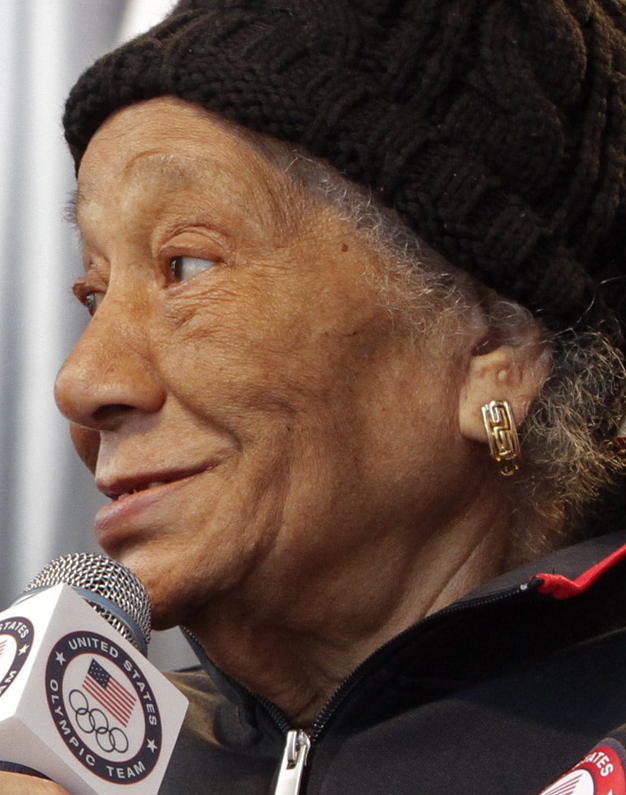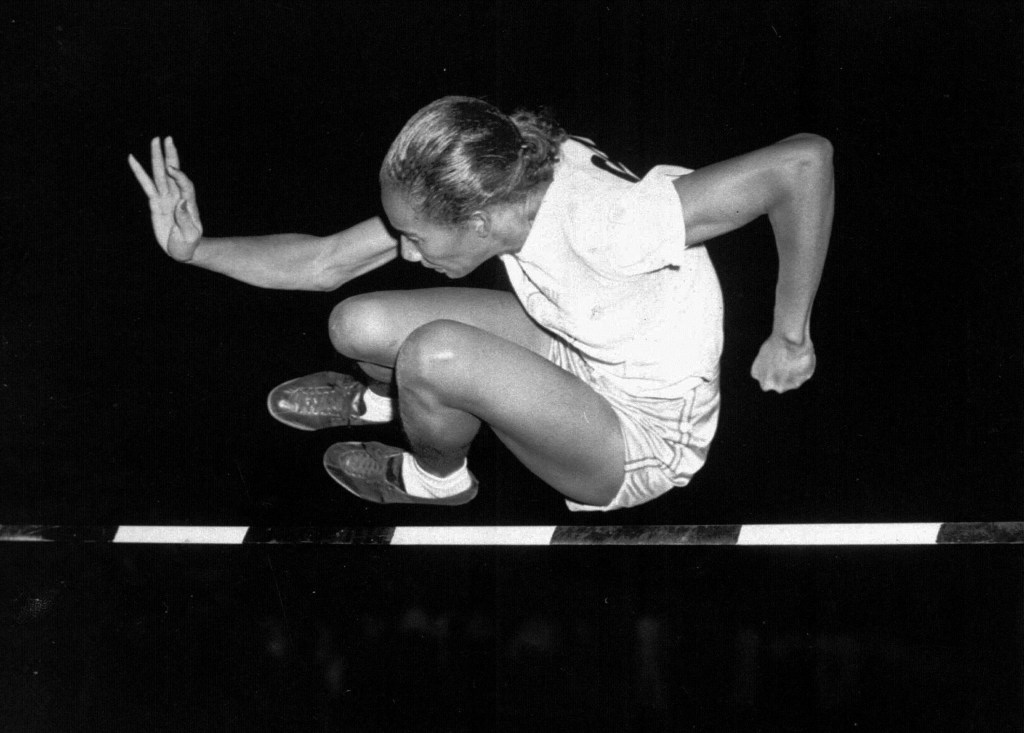Alice Coachman, who began her path-breaking athletic career running on the dirt roads of Georgia and became the first black woman to win an Olympic gold medal when she leapt 5 feet, 61/8 inches in the high-jump event at the 1948 London Games, died Monday at a hospital in Albany, Georgia.
She was 91, according to her daughter, Evelyn Davis-Jones, who confirmed her death and said the cause was cardiac arrest.
Coachman was one of 10 children and grew up in the segregated South, where she was barred from training at public athletic facilities because of her race. She recalled running barefoot and jumping over fences and bars fashioned from rags and sticks to hone the talent that was evident from an early age.
“That girl is going to jump over the moon,” an acquaintance once told her mother.
“She’s going to break her neck, that’s what she’s going to do,” her mother replied.
Beginning in 1939, Coachman amassed 10 consecutive national titles in the high jump. (She also won the 50-meter outdoor title every year from 1943 to 1947 and held a total of 25 national titles, according to the USA Track and Field Hall of Fame.)
In 1948, the year after Jackie Robinson broke the color barrier in major league baseball, the London Games offered Coachman her first – and, ultimately, her only – opportunity to compete in the Olympics. Previous Olympics had been canceled because of World War II, and by the time Coachman disembarked in London, she felt her abilities had peaked.
In the high jump, she bested Dorothy Tyler of Britain (who won silver) and Micheline Ostermeyer of France (who took the bronze). King George VI awarded Coachman her medal.
On her return, she was received by President Harry Truman and first lady Eleanor Roosevelt, according to news accounts, and jazz pianist and bandleader Count Basie held a reception for her. In Georgia, she was feted in a motorcade. A ceremony in her hometown, however, was segregated.
“We had segregation, but it wasn’t any problem for me because I had won the thing,” Coachman told the Atlanta Journal-Constitution in 1995. “That was up to them, whether they accepted it or not.”
Alice Marie Coachman was born Nov. 9, 1922, in Albany, said her daughter. (Some sources provide her year of birth as 1923.)
In her youth, Coachman picked cotton and fruit to help her parents, a plasterer and a homemaker, support their family. Between her work and schooling, she played sports. Her father, she said, would have preferred that she “sit on the porch and act like a lady,” she told NBC. “And I couldn’t do that,” she added.
“I would slip off and go to the playground,” she said in a profile on the website of the U.S. Olympic Committee. “I got whippings, but I kept going and still getting whippings. I got to the point where I was getting three in a day, one in the morning for my math, one in the afternoon for fighting and one in the afternoon for slipping off. I guess when they found out that I was determined to play ball, they just let me go.”
When she was prohibited from training at the designated facilities, Coachman told CNN, she simply “went on and started running and training on the dirt road.” After being recruited to the Tuskegee Institute (now Tuskegee University) in Alabama, she received proper shoes.
Asked what they felt like, she quipped, “It hurt.”
She credited her teammates there, among others, with inspiring her determination to compete at increasingly advanced levels.
After receiving a degree at Tuskegee, she received a bachelor’s degree in home economics from Albany State College in 1949. In the 1950s, Coca-Cola hired her as a product spokeswoman. She worked as a teacher and started a foundation to support young athletes and veterans of the Olympics.
Her first marriage, to Dr. N.F. Davis, ended in divorce. Her second husband, Frank Davis, predeceased her. (For much of her life, Coachman used the name Alice Coachman Davis.)
Survivors include two children from her first marriage, Richmond Davis of northern Ohio and Evelyn Davis-Jones of Albany; a sister; a granddaughter; and two great-grandchildren.
Coachman is credited with helping inspire the careers of Olympians including Wilma Rudolph, Jackie Joyner-Kersee and Florence Griffith Joyner.
“I knew I was from the South,” Coachman once told The New York Times, “and … you had to do the best you could. I made a difference among the blacks, being one of the leaders. If I had gone to the Games and failed, there wouldn’t be anyone to follow in my footsteps. It encouraged the rest of the women to work harder and fight harder.”
Copy the Story LinkSend questions/comments to the editors.




Success. Please wait for the page to reload. If the page does not reload within 5 seconds, please refresh the page.
Enter your email and password to access comments.
Hi, to comment on stories you must . This profile is in addition to your subscription and website login.
Already have a commenting profile? .
Invalid username/password.
Please check your email to confirm and complete your registration.
Only subscribers are eligible to post comments. Please subscribe or login first for digital access. Here’s why.
Use the form below to reset your password. When you've submitted your account email, we will send an email with a reset code.